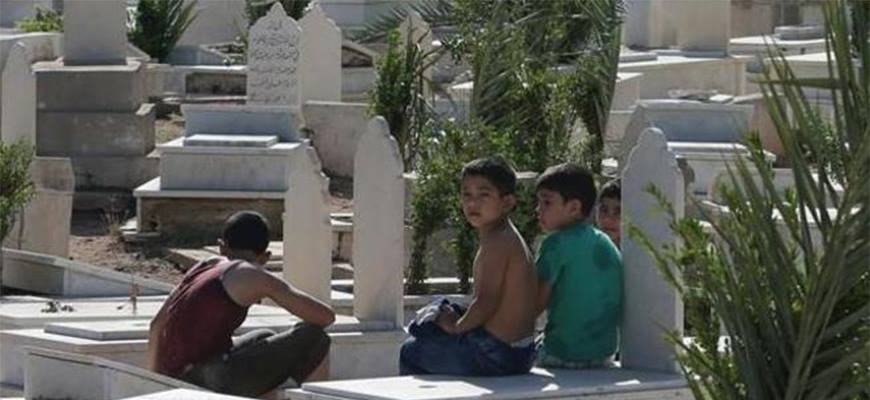
30 Sep 2015
This summer, Hassan, a Syrian refugee who was severely injured in fighting in his war-torn home country, died after being brought to the Lebanese village of Akar.
Hasan’s cousin, however, was forced to keep the body in a tent for three days before he was finally able to find a place and the money to bury it.
“It was extremely hot weather,” Hassan’s cousin, Mohamed, told Anadolu Agency. “We could only reduce the swelling of the reeking corpse by placing bags of ice on it.”
“I contacted several municipalities for help,” he recalled. “They finally gave us a plot of land in a cemetery, which cost $300.”
Hassan and Mohamed’s story is all too familiar to many Syrian refugees who struggle not only to stay alive but also in many cases to bury their dead.
Many tell stories of how they were forced to leave the bodies of their dead relatives unburied for several days in tents or hospital refrigeration units.
In many places in Lebanon, such as the Beqaa Valley, Syrian refugees have been banned from burying their dead on public land because it belongs to the Lebanese Agriculture Ministry.
“I allowed the burial of 150 bodies as a goodwill gesture, but we can’t take anymore,” said one Muslim sheikh from Faour, a village near the Beqaa Valley who preferred not to give his name.
Tension has mounted recently between Syrian newcomers and the local people of Beqaa, who in some cases have asked the refugees to reinter buried bodies elsewhere.
“Many well-off individuals have come promising to open new cemeteries,” said the sheikh from Faour. “But, unfortunately, this never materializes.”
At the outset of the Syria conflict, now in its fifth year, the Akar region had been different, with residents of Qubbet Shamra, a seaside village, allowing refugees to bury their dead in the local Al-Chaheed Cemetery.
But now, things have changed. After hosting the Syrians for more than four years, the local municipalityno longer allows them to use the 4,000-square-meter burial ground.
Abou Abdo, the supervisor of a tented settlement in Qubbet Shamra often mediates between the refugees and municipal officials in an effort to find low-cost plots of land for burial purposes.
“We are facing an enormous problem,” he told Anadolu Agency. “I now have a refugee on his deathbed, while the municipality says it has no land for more burials.”
Under the current difficult circumstances, some Syrian refugees now sneak out at night without the municipality’s approval and bury bodies wherever they find space.
The Qubet Shamra municipality is now under considerable pressure to allow the use of its only cemetery.
“My hands are tied,” Qubet Shamra’s municipal chief told Anadolu Agency. “If someone comes asking my help, I will have to turn him down.”
He added: “I truly have no solution to this problem.”
The crisis is compounded by the failure of most Syrian refugees to register deaths with the Lebanese authorities, which means deceased individuals are officially considered “missing”.
“Refugees aren’t registering their dead unless there’s an accident involved,” said Khaled Asmar. “They simply settle it by carving the deceased’s name on a gravestone.”
According to UN spokesperson Lisa Abou Khaled, the UN learns of the death of Syrian refugees either through verification exercises or when family members inform them of a relative’s death.
“Verification exercises are conducted on a daily basis when refugees come to renew their registration certificates or come to add newborn babies to their registration files,” she said.
“But we don’t remove the names of deceased refugees from our database unless an official death certificate is provided,” Abou Khaled told Anadolu Agency.

 عربي
عربي